#Dani Martínez
Photo
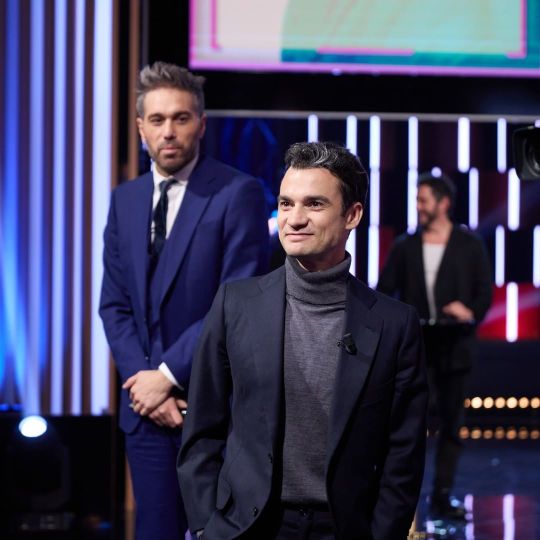
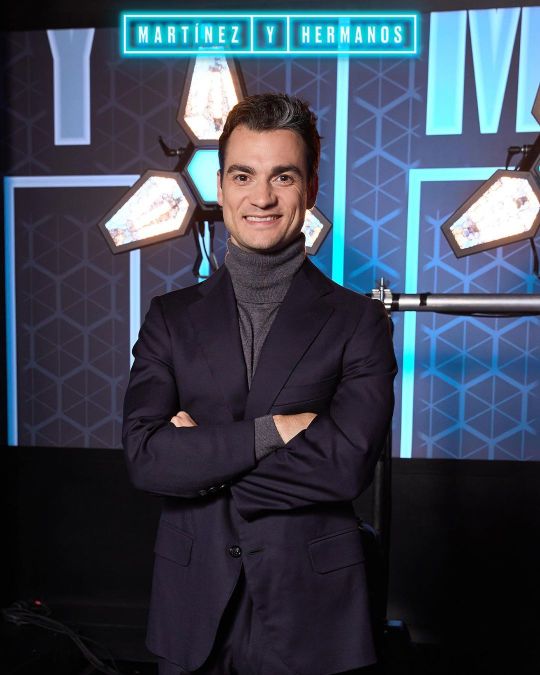


Dani Pedrosa for Martínez y Hermanos (16.03..2023)
#Martínez y Hermanos#Dani Pedrosa#Tiny king#Tiny samurai#My daily dose of Dani#Paco Leon#Carolina Yuste#Dani Martínez
12 notes
·
View notes
Text
Martina s'emporta la Passada d'Or en ‘Got Talent’ cantant en llengua de signes
Martina s’emporta la Passada d’Or en ‘Got Talent’ cantant en llengua de signes
Text: Laura Baranda García / elgeneracionalpost.com /
Foto: Instagram: @gottalentv
Martina se lleva el Pase de Oro en ‘Got Talent’ cantando en lenguaje de signos
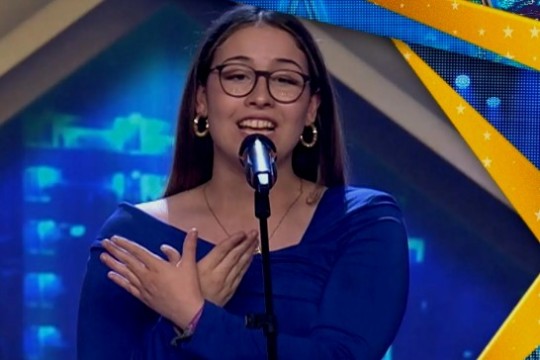
View On WordPress
0 notes
Text

Dani didn't went retro, but he jumped inti a AJS 350cc bike
28 notes
·
View notes
Text
Ya llego la vuelta a España la última grande de la temporada

Esta sera la más abierta de los últimos años, a esta edición llegan varios candidatos a llevarse el titulo sin un dominador absoluto, entre los favoritos tenemos al colombiano Daniel Felipe Martínez del Red Bull – BORA – hansgrohe y al ecuatoriano Richard Carapaz.
Tambien tendremos la presencia de Nairo Quintana y Rigoberto Urán, aunque ya sabemos que no son los grandes favoritos para el título de seguro darán buenos espectáculos en carreras españolas a partir del proximo 17 de agosto.
visita futbolydeportes.com y lee todo el articulo
#CiclismoInternacional Nairo#Quintana Richard#Carapaz#Nairoman Dani#Martínez#LaVuelta24 Rigoberto#Uran
3 notes
·
View notes
Text
Este museo refleja las contradicciones del mundo actual… “Bellas Artes”

Antonio Dumas es un prestigioso historiador de arte y gestor cultural, culto y sofisticado, aunque bastante cínico y engreído, que es nombrado director de un importante museo de arte contemporáneo en Madrid, al salir victorioso en un concurso para ese puesto.
Una vez asumido su cargo, Dumas deberá lidiar con los singulares personajes del mundo artístico, mientras afrontará circunstancias y conflictos de lo más disímiles, incluyendo problemas gremiales, presiones políticas y situaciones disparatadas con relación a exposiciones y artistas.
Estreno: 11 de abril de 2024 en Star+.
youtube
Creada por Gastón Duprat, Mariano Cohn y Andrés Duprat, la serie cuenta con las actuaciones de Oscar Martínez, Aixa Villagrán, Koldo Olabarri, José Sacristán, Fernando Albizu, Ana Wagener, Ángela Molina, Vera Fogwill, Dani Rovira, Ludwika Paleta y Jorge López.

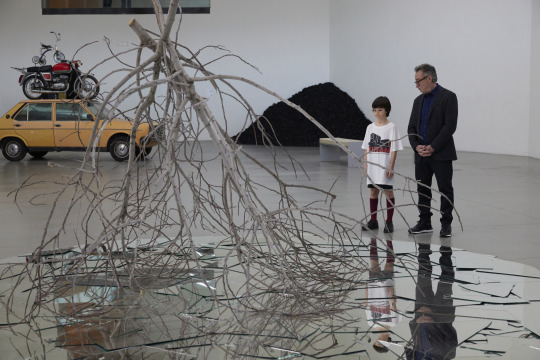




#Bellas Artes#Oscar Martínez#Aixa Villagrán#Koldo Olabarri#José Sacristán#Fernando Albizu#Ana Wagener#Ángela Molina#Vera Fogwill#Dani Rovira#Ludwika Paleta#Jorge López#Series#Star+
0 notes
Text
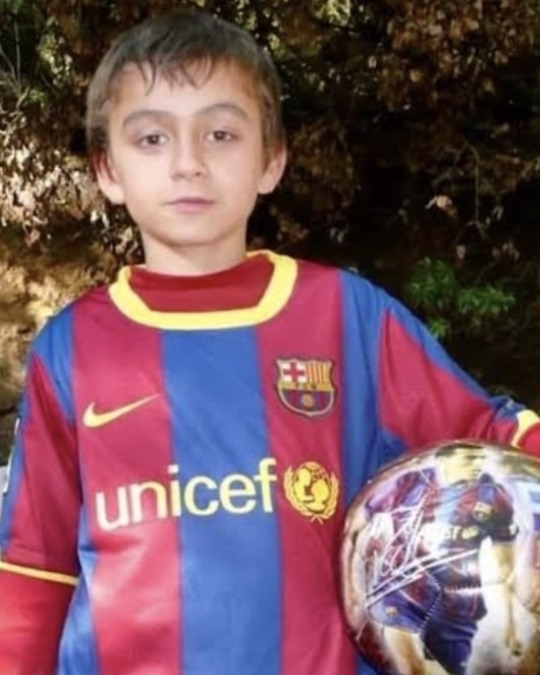
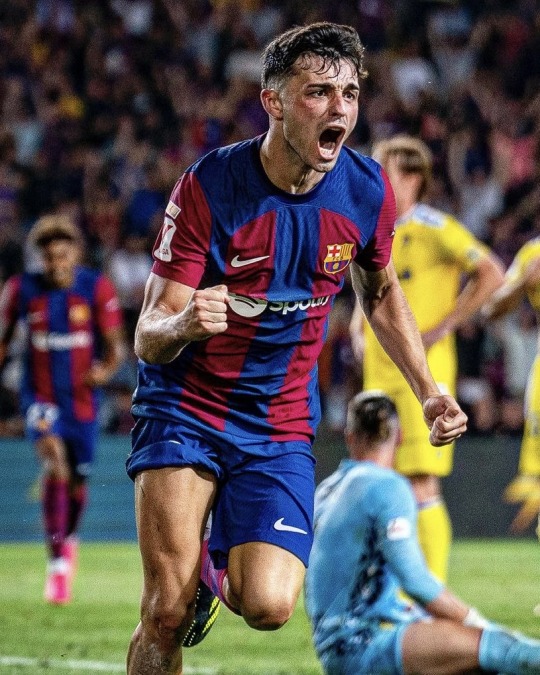
"He is still the same as when he was 5 years old. That's the best thing about him."
(via Revelo - July 2023)
"Now I'm not going to be able to mess with him or make jokes. I'm not going to be able to hit him, because if he's going to hit me back...", laughs Rubén Delgado when we talk about the strengthened physique of Pedri, whom he coached between the ages of 9 and 12 at U.D. Tegueste, when he was a " just small boy, but what he had from a young age was great footballing ability". Pedri has always said that Rubén is the coach who taught him how to compete.
"He arrived at Barça with 60 kilos, very little, and when he completed his first season with Barça he had already gained three or four kilos. With Koeman, he started to do the same work as he does now in that first year, with three days a week of more strength training. Then two, then one, because he arrived as a youngster and there was even the possibility of going out on loan; he even had offers from Bayern to go out on loan. What happened was that when Koeman saw him train, everything changed. From 'we're going to give him a work plan of three days a week' he became a starter, playing every three days, he played everything and, obviously, you then can't have three days of strength work, it's impossible," explains a person close to the midfielder, whom we will call E.P.
"This year is the first time that he has had a real five-week holiday. De la Fuente wanted to take him to the Nations League, but in the end, Barça and the Federation came to their senses and understood that the best thing was to let him rest, have a normal summer for the first time since he is at the highest level and take advantage of it to train, because in the end that way you can see his evolution. He's had five weeks in which he's been able to rest but, above all, to train, because in competition the muscle is eaten away, especially in the lower body. Maybe Tchouameni, who has a great physique, can do more. What Pedri has is a lot of endurance. When he was a kid, he also did athletics at school as an extracurricular activity, and he was very good. That resistance lacked to generate muscle. Chema Martínez has one type of muscle, Usain Bolt another. He had a more fibrous muscle and now he had to gain a bit more volume for 1v1s, and also at the lower body level. The image that has made an impact is that of the arms, but the work above and below has been compensated and worked on following a guideline set by Barça", says E.P., who puts Pedri's current weight at 67 kilos.
The Tenerife native has gained two kilos with that physical work done this summer and is not recommended to gain "more than one". "To take him to the 70 would be too much. That would be the limit. What all parties consider is that he is a player who has to gain muscle mass but he shouldn't change his physiognomy completely. He is a lightweight footballer. His mental rapidity leads him to have quickness of movement, to have some dribbling. If he is heavy with the size he is, 1.74m., he would become in quotes, a 'barrel'," explains E.P., who is clear about what is not the goal in the work that the Barça midfielder is doing: "The objective is not to turn him into a muscular beast because he is not like that. He has a similar physique to Messi. Messi is obviously the best, I hope he comes as close as possible, but he will never be able to be Cristiano. Neither Messi nor Pedri could be Cristiano. Neither does he have the physique of Gavi, who has a more powerful lower body, but Gavi's style of football demands more of that than Pedri's game. It would be a mistake", reflects E.P., who specifies that the Tenerife native has done "a lot of cycling, eccentric pull-ups - those where you go up and then you have to hold on when you come down - and work on the pitch, above all".
'Four Friends'
Those who have closely experienced the physical work and nutritional diet that Pedri has followed during these five weeks have been Dani Carreras, Fran Llarena and Rubén Suárez, the three best childhood friends of the footballer, ex-players of Tegueste, where they were under Rubén's orders.
The 'Four friends', like David Trueba's novel, have shared a summer in a villa in Adeje (Tenerife), although their coexistence has been stricter and based on rest, physical work and a rigorous diet that they have all followed. "In the villa, we had a cook who prepared the food for Pedri's diet. Lots of vegetables, lots of vegetables with spices and fish, sometimes meat. But above all, lots and lots of vegetables. I wanted to eat more, but well, we've adapted to him", says Dani, a striker in the team that Pedri played for from "4 to 16-17 years old".
"It has been a hypercaloric diet, with a high intake of calories to be able to compensate for the expenditure of energy and to be able to evolve the muscle. It depends on the day, the work to be done, the moment, but it has been over 3,000 calories," says E. P. with a figure that is far from the perception of Pedri's friends.
"We ate a lot but, of course, few calories in reality: a lot of vegetables, obviously more than five pieces of fruit a day, when it was time for pasta we ate a lot of pasta, but always in measured quantities. We could skip it a bit because the diet wasn't really for us but for him. Everyone followed his diet...", laughs Fran, Pedri's friend "practically since they were born". "My mother put me into a small football team when I was 3 and he was put into the same football team from 3 to 5 years old. We also lived super close here in Tegueste, about 200 meters away, and we've always been friends since we were kids," says Fran, mediocre "like Pedri, but a bit further back. "
They played together until they joined the youth team, when Fran was signed by Tenerife. This summer, as well as being a friend, he has acted as a personal trainer to the Culé footballer. "He has worked every day: in the gym, he worked five days, rested on Saturdays and Sundays, and outside of it is true that he worked more because we went to the football pitch almost every day for speed training and cardio. We went here in the south of Tenerife, to Tenerife Top Training - where I am also told that Courtois occasionally goes - to a field called T3, and there we worked with cones. I helped him with explosiveness, if I had to pass him balls, put the cones on him... I helped him and trained with him. There was a day when he killed me to run with him and I said: 'No more'", recalls Pedri's friend, with whom he has also shared afternoons of paddle tennis and paddleball.

They have hardly left the village for anything other than training or eating out one day a week. In Adeje, they have enjoyed the swimming pool, "we have played a lot of Monopoly and Catan, and cards, baraja española (spanish card deck); al Presidente", says Dani.
It's been days based on the physical and nutritional discipline that Pedri has been fulfilling to the letter, with a self-demanding attitude that has grown as a result of the injury he suffered last February against Manchester United in the Europa League. In a solo action, he injured the rectus anterior of his right leg. It was the 41st minute. He himself asked to be substituted. That day was a before and after for the player, explains Fran: "He is very demanding because he has already had several injuries and since then he has changed his training and eating patterns to try not to relapse. His nutritionist was on top of it, because there have been many injuries to the same muscle in the 2-3 years he has been in professional football, this would be his fourth, which is noticeable at the end of the day; the 70 games he played in his first year at Barça are going to take their toll on him now, at any time. He's always taken care of his training, but this time it's more exaggerated".
A task in which he is helped by his disciplined personality. "He has never, never, never been a soft drink drinker, he always drinks water or isotonic drinks, sports drinks", Dani explains. Rubén recalls that "he has never been one for sweets either". "He likes chocolate, but chocolate products are another thing that has completely disappeared: sweets. In fact, he goes to events and takes his heavy, calibrated snack, his fruit, grapes with I don't know what nuts... And, look, one thing he loves, a healthy vice, is pistachios. He loves them, but he can eat very little because it's a good source of energy, but the ones he eats he eats without salt and so, zero problems. There is another food that he has been eating since he was little, obviously, which is bananas. He can put bananas in everything, it's incredible. Before Plátano de Canarias was his sponsor, when he started as a professional, he put a banana in his boot. Now he eats, but the range of fruits has expanded a lot. And another thing about Pedri is that he never drinks coffee. We've joked with him once or twice: 'Oh shit, if you drank coffee, you'd get nervous from time to time and you wouldn't be the same anymore'," says E.P. anecdotally, who also reflects a striking feature of Pedri's personality that is helping him to follow a disciplined life: punctuality.
"He's hyper-punctual. You say 'This is a Canarian, a relaxed guy...', and yes he has that relaxation, that pause, that semi-Caribbean Canarian tranquillity, but in terms of punctuality, he's a fucking German. He has many points of discipline but before they weren't united in anything. Now everything has some guidelines, it's blending and uniting well," reasons E.P., who says that Barça, "at least since the arrival of Xavi", forces them to have lunch or dinner at the Ciudad Deportiva.
Rosi’s Croquetas
But there is a common denominator between the four voices that paint Pedri's sporting and nutritional life: the croquettes of his mother, Rosi, which the Tenerife player himself mentioned on Saturday during Barça's American tour when asked about his physical change. "Above all, not eating my mother's croquettes," said the player.
"His mother is a spectacle, she's a machine. Her croquettes are a different story," Dani laughs. "The only treats are his mother's food or going out to eat. I had one meal a week off, so maybe we'd go out to eat somewhere, healthy food too, but eating differently from what your diet is. And it is true that he ate pistachios, he usually eats a lot of them, because he likes them, but healthy ones, of course, without salt. And little else", explains Fran.
"He has always had a fairly balanced diet and well, above all, the famous mother's croquettes, he was very well fed," says Rubén, who assures us that "you need to take time to try them because they are delicious." "They offer a variety: chicken, cod... They have it all. I can vouch for it, I recommend it," he says with a laugh.
Rosi is Pedri's mother and cook at the Tasca Fernando, which she runs with her husband and the footballer's father "at the entrance to Tegueste on the Nacional", explains E.P. "It's the typical small-town place, traditional, where you eat very good homemade cuisine, with very good produce. And of course, Pedri ate there every day until he went to Las Palmas, where he stayed in the residence, in La Casa Amarilla. They could make him slightly different dishes, but in the end, he ate what was available. It’s a normal, ordinary, hard-working family. When they go to see him in Barcelona, they also cook for him, but now the whole family is very conscientious and they are helping him a lot", he says.
His brother Fernando has played a key role in his healthy eating since his arrival at FC Barcelona. "He lives with his brother in Barcelona, near Ciutat Esportiva. As the first year they were at Barça was the year of the pandemic, they went to live together. Fernando studied cooking. He is two years older but as Pedri was always ahead of his time, they played football together for many years. They are like friends and brothers at the same time, and he cooks for him".
"Skinny and tiny"
Talking to Dani, Fran and Ruben has been visualizing the Pedri who started playing football in Tegueste in his earliest childhood, when their lives came together and it was clear to all three of them that that "weak and small" child would go far. "He had something," says Rubén, who always told his partner and his parents, to those around him. "It was to be expected," Fran says. His coach recalls how the three, Pedri, Dani and Fran, "were very good, were the best, and super nice people."
"He has always had a mentality that is not cold, because he is not cold, but a very relaxed mentality, so to speak. If the game is at 100, he would stay at 25, to give you an idea. And that control, and especially at the ages that I coached him, it was very difficult to see a child who controlled the guidelines of a match as much as him; who knew that if the match was very, very tense, he would take it to his own ground and take it to where he wanted it to be. And it's very difficult to find that at that age. Obviously, today you see him and it's even more difficult because you see him inside a stadium with so many people, and with that calmness that he shows and that relaxation and that control of his state, it's very difficult to find that in a player and, above all, as young as he is, who is only 20 years old", recalls Rubén, the coach who moved Pedri's position from the front to the centre of the pitch.
"From a very young age, he stood out from the rest. He did things that a normal 9-year-old didn't do. I always highlight one thing about him and that is that on a footballing level, he obviously had spectacular technique, quality and physique. Because despite being so small he was the first to attack, the first to defend, a spectacular sacrifice towards his teammates... But if there's one thing I've always highlighted about him, it's the footballing maturity he had at the age of 9. He knew how to position himself, he knew where he had to be at all times, which even nowadays professional players work on and not all of them are practically ready. And he, at 9 years old, already knew how to read a game, he already had a very adult sporting maturity for the age he was", says the coach proudly.
"I remember that when in one of the many games in which he was playing and he was killing it and doing things that were not normal, of course, the game ended and at that time I asked him: 'Hey, why did you decide to do this?', and any other child would have said to me: 'Well, look, I did this because I saw it like this…'. And he came in with the little soft voice he had and said, 'I don't know, Ruben, it just came out of me. ' And my colleague and I looked at each other like: 'It just came out of you?, but I didn’t even do that at 25 years old…", recalls the coach.
A similar situation to the one we experienced in the 2021/22 season, when on April 3 Pedri gave Barça a 1-0 victory over Sevilla and placed Barça second in the table. "He cuts once, twice, three times and then hits it with his left. He said he didn't know what he had done, that it just came out of him like that," remembers Rubén, who confesses that when he had the opportunity to talk to Pedri he told him: "Man, that was the same thing you said to me when you were 9 years old."
"The problem for me is that as I've known him all my life, I'm not surprised by what he does. Yes, on the one hand, he surprises me sometimes, when I realise and say: 'Woah, my friend is doing this' and I see him in a different way, but only for a moment because then I remember that it's him and that it was to be expected. From the minute he stepped on a professional pitch he remained the same. He doesn't care who he plays against. Even when we were little, we played on a court, in a pavilion, and he would tell me: 'You play with me', and the brother, and we would play against 20-year-olds, and we were 14. And they'd say, 'Well, come on, but just for a bit.' There were three teams and the one that won was still there. So we got with the team, we were 14 years old and some were 16 and 17, and we beat kids who were 20, 21, 25, and of course, they were shocked. They said: 'But what about these kids?', and especially with Pedri, because he was the youngest and the best. If you see him doing that on the pitch from a young age, with 20-year-olds, knowing that he doesn't care if he gets kicked, or if he gets his body thrown around, or if they take him out, because that has adapted him to professional football, it doesn't surprise you" recalls Fran about a physical and sporting stature that has always accompanied Pedri. Just like the Barcelonismo, which he also lived from his cradle. His grandfather Fernando founded the Peña Barcelonista de Tenerife-Tegueste.
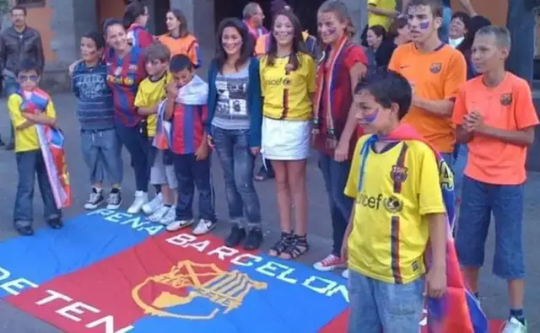
"He is still the same as when he was 5 years old. He's the same person. That's the best thing about him. He also has a very good family that helps him keep his feet on the ground. When you're with him, you say: 'And this guy is playing for Barcelona'. Also, one thing he has is that when he gets picked on... Maybe you say to him: 'How few goals you score'. Me, for example, I'm a big fan of screwing with him. Yes, yes, I don't know what, but you don't score goals', I say things like that. And when he's picked on, he always gets it. And this year is going to be quite important for him and for Barça. He's going to start to be one of the leaders, I think. He already is, but his character is not that of a leader, but the way he plays. He's a very fundamental player, but he doesn't feel like a leader. No way, no way, that's not the case", admits Dani, who reveals Pedri's joking character. "He seems shy, but he jokes a lot, he's always joking around, with everyone in general. I'm always calling him silly and stuff like that," he laughs.
Calm, familiar, punctual… and with a low heart rate
"The important thing is that you have clear ideas, because at the end of the day, that life is not easy. It's very easy for many things but it's not always easy to carry all of it, not being able to go out, that kind of thing. That he knows his priorities and that he doesn't get too carried away, that's the key for me, beyond a kilo more muscle or not, because you have to be very good in everything and that luck is with you, but if you're not focused, success will not last long. He is familiar, calm, with a low heart rate. May he continue like that", asks E.P. for the future of Pedri, who is going to live an important year this season after the departure of Busquets, the arrival of Gundogan and his demanding summer to get back in top physical shape.
"When he has been asked the typical question: 'What do you need to improve on,' he has never said anything other than these concepts: more goals and physical improvement. In five months, he scored seven goals. If he hadn't been injured, he would have doubled that. This year he should have at least 10-12 goals. Xavi asks him to do that and he will always work to the maximum", explains E.P.. When the competition begins we will see how he establishes his physical form on the pitch. His appearance is already improved, muscular, in a "work of prevention and evolution" that his friends hope to see in sporting terms, in the present and in the future.
"Remember that he is still only 20 years old, normally a footballer explodes at 25, 26, 27, 28 years old. And that's the beautiful thing, that he still has fifteen years of football left and hopefully he continues to rise," says Fran.
"You know what happens? He has the gift of knowing how to win people over. He has a great gift for companionship. So, he is lucky that if he says 'everyone around here', I think they will follow him. Why? Because he has that gift, he has the personality he has, a personality that engages, that transmits good vibes, as they say around here. He is still a bit young to perhaps be a leader, but it is true that I think that at "Barcelona they have noticed that his presence on the field helps the team play in one way or play in another. And I think that is being a leader," Rubén reasons.
Winning leagues, taking Barça back to great heights in Europe, winning a European Championship or a World Cup are some of the challenges that the four protagonists outline around Pedri, but one stands out above all: after having lifted the Golden Boy 2021, it would be to win the Ballon d’Or. "It would be a dream for all of us," says Rubén with a huff. "It’s just that this kid surprises you every day, you don't know where his ceiling is, he's only 20 years old," stresses Fran.
E.P. has this to say on the matter: "It's not something that torments him or keeps him up at night, he prioritises the collective trophies, but obviously it's a consequence of everything, it's an evolution. Neither Iniesta nor Xavi managed to win it, none of his idols have been able to do it. Rodri has done very, very well and his team has performed very well. There is already talk that Rodri could or should have a Ballon d'Or. If Pedri continues to be one of Barça's flagship players, as he practically already is, and Barça regains its usual status of the last 20-25 years and the national team is up there, then why not, but that's a long way to go. To win a trophy of this type, you have to have powerful collective trophies, because Haaland or Cristiano could win it if they score 50 goals, but it's different with him. Let's see, for the moment, how he settles in this new season in which he wants to have continuity again".
And it’s up for the future to see how his new physique responds, but if there is one thing that does not generate doubt among his friends it is his name: "With this new bodybuilding, is it going to be necessary to call him Pedro instead of Pedri at some point?" I asked. Dani laughs before remembering that Pedri was given the name when he was 8-9 years old, "because there were two Pedros in the team and the other one was much bigger than him, so they kept calling him Pedro and him, who was much smaller, Pedri". "For us and for everyone he will always be Pedri," adds Rubén. "He is Pedro González López. Maybe when he is 55 and playing dominoes in his village they will start calling him Pedro, but in the meantime, I doubt he will stop being Pedri", reflects E.P. "Pedri is and will always be Pedri", says his friend Fran.

117 notes
·
View notes
Text
Dani, his parents, and his physiotherapist talk about his injuries. Part 1. Part 2.
Transcription:
[Commentator: Dovizioso, Lorenzo and Pedrosa are all down!]
Dani: One injury two injuries, three injuries, four injuries, it depends on the time [frame] they happen in. No, they don't affect much. But… 1, 2, 3, 4, 5, 6, 7, 8, so many in a row, together, they do. Injuries at key moments leave deeper scars. They're harder to forget. They're moments that stay with you. They can have an impact on your character, your perspective or your focus on the future.
I don't know exactly how many stitches I have. But I'm sure that I have more than 200. They're life experiences, at the end of the day, and you have to find the positive aspect.
Antonio Pedrosa, Dani's dad: The truth is when I've seen him suffer, I've regretted it. And I blamed myself for that accident, because I put him there. But then I would see him, he'd get better, and I'd see that he wanted to continue and get back on the bike. And I'd forget about it. But I have felt guilty.
[Dani, on video at the hospital: They asked whether I want to go home early or not, I said I'd wait to see how I feel.]
Basila Ramal, Dani's mom: Dani has so much love for what he does, he loves motorcycle racing, so… he has so much passion that I think that's where he finds his strength to keep going and to get back on the bike.
Juan Martínez, Dani's physiotherapist: The brain is different. The person is different, your life has changed because now you know pain. You could have died. You could have seriously hurt yourself. Dani's problem is his bad luck when he falls because he has a bone structure that is so fine, like a child's skeleton, every time he falls, it breaks. It's like glass.
#dani pedrosa#theme: injury#media: video#source: the silent samurai#injury#crash#i hope the transcriptions are even just a little helpful <3#danilovefest
11 notes
·
View notes
Video
youtube
Residente explica sus 9 canciones más importantes | 9 Barras | GQ España
La única constante en la carrera musical de René Pérez Joglar, aka Residente, es la reinvención. Y en eso justo está ahora, en un nuevo viaje musical que le ha de llevar a escribir un disco absolutamente personal, liberado de todos los condicionantes de la industria, y en una película sobre el Puerto Rico de 1898 que será su estreno como director de cine. A medio camino entre su anterior singladura y estos proyectos de futuro se encuentra su nuevo trabajo, Las letras ya no importan, que sale a la venta el 22 de febrero y que cuenta con la colaboración estelar de Penélope Cruz —la oscarizada intérprete madrileña actúa en el videoclip de la canción 313—. Residente abre un nuevo capítulo. Y promete ser tan interesante o más que los que le han precedido. En este episodio de 9 BARRAS, Residente explica desde sus inicios hasta su último disco (LAS LETRAS YA NO IMPORTAN), sus grandes éxitos como Latinoamérica, René o Ron En El Piso.
Entrevista por Alexia G. Ferrer
Producción: Asha Martínez
Producción en set: Andrea Vázquez
Realización/DOP: Jacobo Herrero
Operadores de cámara: Daniel Moreno y Vicente Gayo
Gaffer: Álvaro Ramiro
Sonido: Julián Vaquera ‘’Piru’’
Grooming: Raquel Aragües
Edición: Dani Belchí
Supervisión de postproducción: Modernetta (Ismael G. Nicolás)
Talent manager: Loreto Quintanilla
#youtube#residente#puerto rico#todo lo bueno de puerto rico#rené pérez joglar#gq españa#boricuas#artistas de puerto rico#puertorriqueños
3 notes
·
View notes
Text
Reseña de la exposición General Rincón Gallardo 14
Por Nancy Soriano Arce, estudiante de la Especialización en Historia del Arte
Una obra gris es un espacio que promete una transformación que sugiere un futuro con bases sólidas a pesar de los pisos irregulares, las paredes sin acabados y el polvo por todos lados. Un edificio inacabado no parece ser el espacio ideal para una exposición de arte, sin embargo sucede a pesar de las bajas probabilidades de serlo.
General Rincón Gallardo 14 es una exhibición colectiva de arte contemporáneo presentada por Andarín, un proyecto de investigación, reflexión y estudio del hábitat. La inauguración tuvo lugar la noche del pasado viernes 22 de septiembre en un espacio en construcción ubicado en la calle homónima, en la colonia Ampliación Daniel Garza en la Ciudad de México. La exposición está compuesta por pinturas, fotografías, audiovisuales y esculturas de 21 artistas: Antonia Alarcón, Andrea Bores, Patricia Carrington, Miguel Casco, Alonso Cedillo, Dani Escamilla, Alfredo Esparza Cárdenas, Ángela Ferrari, Anahí H. Galaviz, Manuel G. Romo, Eugenia Jico, Darinka Lamas, Andrea Martínez, Cecilia Miranda Gómez, Rubén Ojeda Guzmán, Alejandro Palomino, Emmanuel Rodríguez-Mazón, Fernanda Suárez, Edgar Solórzano, Omar Torres y la La Pinche Adultez.
En una suerte de literalidad, al llegar a la calle General Rincón Gallardo y buscar el número 14, imaginé, basándome en mi experiencia con galerías de arte contemporáneo típicas, que sería otro cubo blanco pero intencionalmente incompleto o con muros sin aplanar pero se trataba de un espacio crudo, realmente en obra gris.
Una tabla con una cubeta como peso para mantenerla abierta que hacía las veces de puerta, dejaba ver un resplandor rojizo que invitaba a curiosear. En la entrada había un anuncio de neón con las letras ‘General Rincón Gallardo 14’ y una pieza colgante con una luz amarilla debajo que disiparon por completo la duda sobre si era el lugar correcto. La experiencia había comenzado.
A lo largo de los tres niveles del espacio de exposición, la muestra exhibía piezas como la fotografía de gran formato de Omar Torres, las pinturas naturalistas de Antonia Alarcón y Ángela Ferrari, la instalación de paneles móviles de Eugenia Jico, las pinturas de desnudos pixelados de Miguel Casco, las fotografías de Andrea Martínez o los textiles de La Pinche Adultez, entre otras, mostrando un diálogo de similitud y adaptación a los espacios, dejando a los espectadores la posibilidad de relacionarlas por su formato y tema.
En los niveles superiores el espacio permitió la presentación de la pintura e instalación de Alonso Cedillo en dos instancias: en un espacio reducido y de difícil acceso se encontraba una pintura de un teléfono móvil sobre un inflable en una piscina. Luego, al continuar el recorrido, se descubría una pequeña sala donde se proyectaba un audiovisual sobre el mismo tema de la pintura. Daba la sensación de ser un mismo momento pero visto y experimentado por dos personas distintas.
En una las últimas salas al aire libre, se activó una obra con pirotecnia que reveló la frase ‘Aquí no pinto nada’ del artista Rubén Ojeda Guzmán, al tiempo que ofrecía un cierre a la inauguración completando la obra gris para transformarla en un lugar perfecto para la experimentación, centrándose en la experiencia del visitante. Sin ofrecer un contexto extenso, se buscó crear un diálogo entre las obras desafiando lo habitual al seleccionar cuidadosamente solo algunos aspectos del arte contemporáneo, aquellos que logran capturar la atención.



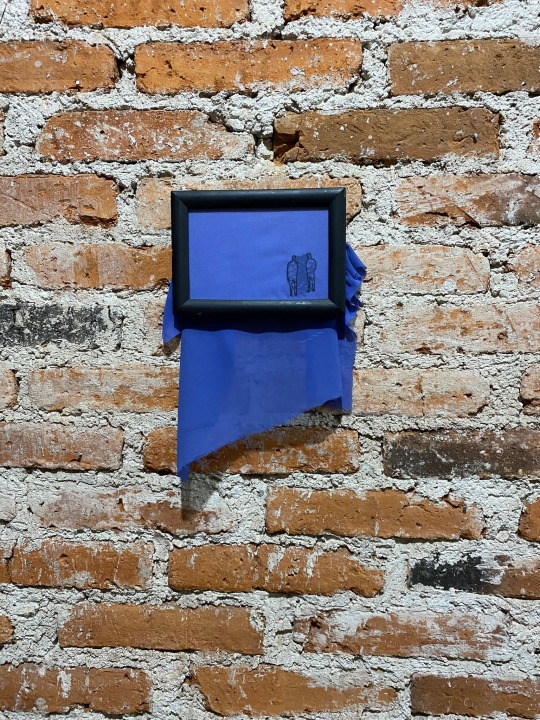
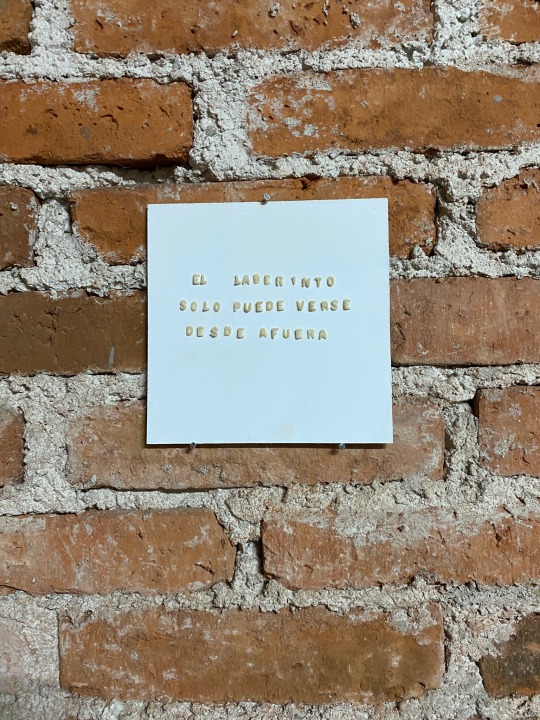
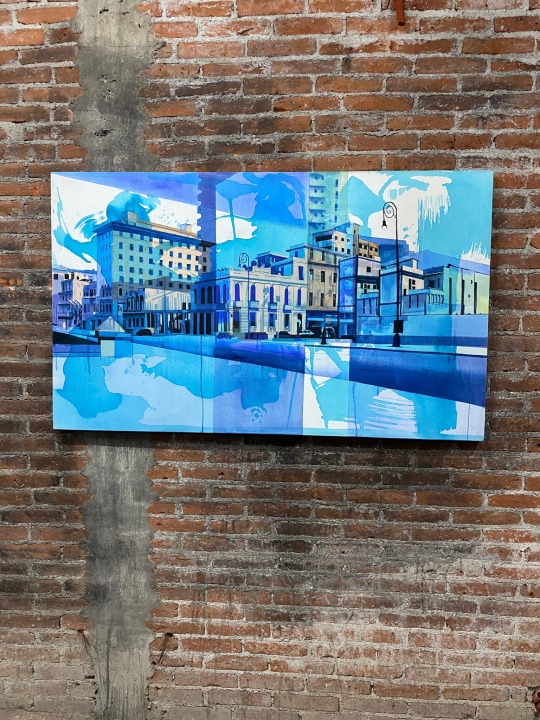
#Andarín#arte contemporáneo#ciudad de méxico#obra gris#reseña#historia del arte#art#contemporary art#white cube#cubo blanco
2 notes
·
View notes
Video
undefined
tumblr
Jorge was and is in love with Dani. The absolute prove.
Okay so this is a preview from ‘Cuatro Timpos’ and they are discussing about rivalries in the Paddock/MotoGP. But look at Jorge staring and looking at Dani.
So here Dani says that they (Jorge and him) didn't like each other. Jorge smirks and becomes sarcastic. Everyone laughs at it like it’s a joke. Izaskun says ‘Now understand everything’ and Jorge goes back to saying ‘we didn’t like each other’ and he seems a bit pissed.
So I think Jorge like/love and has always liked/love Dani.
#MotoGP#DAZN Spain#Cuatro Tiempos#Izaskun Ruíz#Álex Crivillé#Jorge Martínez#Jorge Martínez Aspar#Aspar#Jorge Lorenzo#Dani Pedrosa#Tiny king#Tiny samurai#My daily dose of Dani#Pedrenzo
82 notes
·
View notes
Text



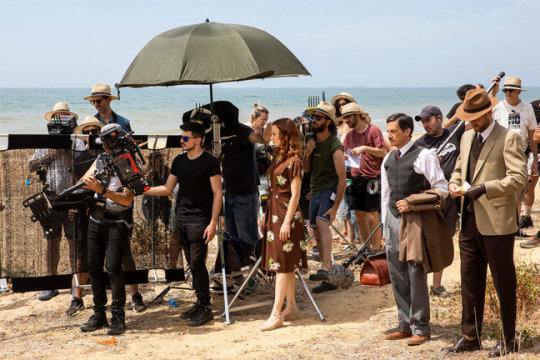
New upcoming period drama: Operación Barrio Inglés
Co-produced by RTVE with Onza (El Ministerio del Tiempo, Parot, Hernán) and the Andalusian production company Emociona Media, filming begins for Operación Barrio Inglés, a new intrigue drama for the TV channel La 1.
Spies, Nazis, British and a risky love story set in Huelva in 1940, a city where the conflicts of World War II are reproduced on a smaller scale.
Synopsis
World War II has just broken out.
Although Spain is "neutral" under Franco's dictatorship, Huelva is a strategic enclave to control the ships of both sides that cross the strait. In addition, it has an important British colony. For this reason, the Germans send members of the Secret Service to control what happens in the city, especially in the mines in the province of Huelva, owned by the English, and which provide Great Britain with ore for weapons and artillery.
In this way, Huelva becomes a veritable nest of spies from both sides, among whom the young Lucía is forced to move. She has just turned 25 and has been hired by an English mining company to work in their offices as a secretary.
There she meets the company's manager, Peter, an attractive Englishman with a dark past who drags Lucía into an adventure in which she will be forced to take sides. When you're in the middle of a war, being neutral is not an option.
Data Sheet
Executive Producer: Gonzalo Crespo Gil, José María Irisarri, Pilar Crespo, Gonzalo Sagardía, Clara Almagro, Santiago de la Rica
RTVE executive production: Borja Gálvez
Production Director: Onil Ganguly Directed by: Chiqui Carabante José Ramón Ayerra
Plot direction: Manuel Ríos San Martín Screenwriters: Manuel Ríos San Martín, Victoria Dal Vera, José Ortuño, Virginia Yagüe, Pablo Tobías and Tatiana Rodríguez
Photo Direction: Dani Salo (A.E.C.) and Alejandro Espadero (A.E.C.)
Art Direction: Hector Bertrand
Casting Direction: Juana Martínez
Music: Pablo Cervantes
Wardrobe: Matías Martini
Makeup and hairdressing: Anabel Beato
Cast
The series will star Aria Bedmar (Lucía), Peter Vives (Peter) and Rubén Cortada (Francisco).
The cast is completed by Paco Tous (José), Juan Gea (Enrique), Bea Arjona (Amparo), María Morales (Cinta), Chiqui Fernández (Rocío), Kimberley Tell (Agatha), Aida Ballmann (Miss Eva), Silvia Hanneman (Hanna), Yan Tual (Victor), Sue Flack (Miss Parker), Marco Cáceres (Juan), Almagro San Miguel (Toni), Carla Nieto (Sylvia), Ángela Chica (Belén), Clara Navarro (Rebeca), Fran Cantos (Oskar), Stefan Weinert (Schneider), Kevin Brand (Kurt), Frank Feys (Edward), Craig Stevenson (Goodwill), Edu Rejón (Gianni), Gregor Acuña (Dieter), José Luis Rasero (Civil Guard Captain), Gonzalo Trujillo (German Consul), Ken Appledorn (English ambassador) and Carlos Olalla (Father Damián), among others.
Filming
Operation Barrio Inglés will have as its settings the old dock of the English mining company and the area of Tinto River and its open-pit mines, as well as the Bellavista neighborhood in the town of Minas de Riotinto, the port of Punta Umbría and the Mazagón beach in Huelva. In Sevilla, among other locations, it will be shot at the Monsalves Palace, and in other areas of the city and province, and also in different parts of Jerez de la Frontera.
About the mines and their location:

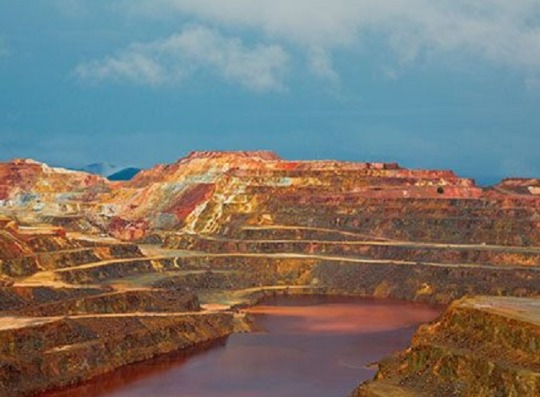

This is the Tinto river, its waters are red due to the high concentration of sulfur and iron oxides in the land (it happens the same with the red lagoon of Mazarrón's mines, Murcia), although it's duscussed if the mining activity has been increasing this characteristic, its water are very acid and are poluted with heavy metals.
The Tinto river (ancient name: Luxia) starts its flow in the Aracena Mountain Range and after 100 km joins the Odiel river (ancient name: Urium) at the height of the city of Huelva.
The mines have been exploited since pre-roman era, by Iberians and Tartessians, to obtein iron, copper, magnesium, silver and gold, which improved trading with the Phoenician, Carthaginian, and Greek colonies that were near to this site (in fact, the city of Huelva was founded by Phoenicians, and it was called Onuba), and eventually the Carthaginians took control of the mines after their expansion throughthe Iberian peninsula. Later, it became one of the most important mining areas of the Roman Empire.
By end of the 19th century, due to económico crisis the Spanish government sold several mines to English Companies, and one of them was the Riotinto mines, who were bought by the Rio Tinto Company Limited (RTC) in 1873, as they were looking for metals that were very demanded in the country due to its high industrialization (in contrast, in Spain the industrialization was scarce and the two main regions in which it was developed were Catalonia and Basque Country)
The RTC was the builder and owner of the railway line that connected the mines with the port of Huelva, where it built a mineral dock to facilitate the unloading and transport of the extracted material by sea to England.
In Riotinto, the luxurious and exclusive neighborhood of Bellavista was built for English personnel, it was a Victorian-style neighborhood that was endowed with tennis courts, golf courses, its own cemetery, a Social Club or even a Presbyterian church.
Huelva capital will also develop under the English influence. The numerous workshops and facilities built by the RTC that gave work to more than seven hundred workers, such as the railway station, changed the appearance of the city and contrasted with the rise of a new bourgeoisie of both Spaniards and foreigners who found themselves linked to the company. The power of the company became such in the city that civil buildings depended on the interests of the company.
Proof of this are the Reina Victoria neighborhood, as a garden city that welcomed part of its employees; the construction of Casa Colón, which ended up becoming the headquarters for the company's offices; the disappeared English Hospital; or the gigantic mineral pier located on the Odiel River. The English population introduced football, being the Huelva Football Club the first football team in Spain, founded in 1889.
In Punta Umbría, the British managers of the Rio Tinto Company Limited (RTC) erected rest areas for their employees. Since 1883 some constructions were carried out in the area, in wood and of the bungalow type, but it would not be until 1896 when the RTC was granted the possibility of establishing houses in this area, to which many RTC employees and their families went in summer to the beach through the Riotinto railway.
In 1943, the corpse of Glyndwr Michael, a Welsh homeless, disguised as a British Marine oficer called William Martin with information about a fake plan of the Allies to attack Greece was found drowned near the coast of Huelva, in Punta Umbría. This was part of the Operation Mincemeat to distract the Nazis and attack Sicily instead. Operation Mincemeat was a important plot in episode 3×02, Tiempo de Espías, from El Ministerio del tiempo. Well, although in the episode the original Operation is cancelled and a character named William Martin later takes the place of the original "William Martin", so the Operation success.
Years later, in 1954 the Riotinto mines returned to national property, under the CEMRT (Compañía Española de Minas de Río Tinto)
#operación barrio inglés#aria bedmar#peter vives#rubén cortada#paco tous#juan gea#bea arjona#maría morales#chiqui fernández#kimberley tell#aida ballmann#silvia hanneman#yan tual#sue flack#marco cáceres#almagro san miguel#ángela chica#clara navarro#fran cantos#stefan weinert#kevin brand#frank feys#craig stevenson#period dramas#upcoming series#carla nieto#edu rejón#gregor acuña#jose luis rasero#gonzalo trujillo
5 notes
·
View notes
Text
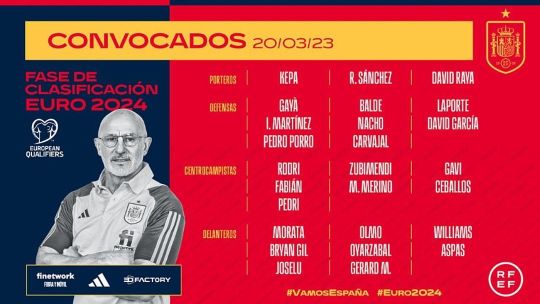
Official list for the upcoming matches against Norway (EURO 2024 qualifier match, 25/3) and Scotland (EURO 2024 qualifier match, 28/3)
Porteros
Kepa Arrizabalaga, Robert Sánchez, David Raya
Defensas
José Luis Gayá, Aymeric Laporte, David García, Alejandro Balde, Dani Carvajal, Pedro Porro, Iñigo Martínez, Nacho Fernandez
Centrocampistas
Pablo Gavi, Pedri González, Mikel Merino, Rodri Hernandez, Dani Ceballos, Fabián Ruiz, Martín Zubimendi
Delanteros
Álvaro Morata, Bryan Gil, Dani Olmo, Nico Williams, Mikel Oyarzabal, Iago Aspas, Gerard Moreno, Joselu
3 notes
·
View notes
Text

CINE
La sombra de la ley (2018)
Título original: La sombra de la ley
España
Dirección: Dani de la Torre
Idioma: Español
Atención: Solo para ver en PC o Notebook
Para ver el Film pulsa el Link:
https://artecafejcp.wixsite.com/escenario-cafejcp/post/la-sombra-de-la-ley-2018
Reparto: Michelle Jenner, Vicente Romero Sánchez, Manolo Solo,
Paco Tous, Adriana Torrebejano, Josep Tosar, Jaime Lorente
Género: Thriller. Drama | Años 20. Policíaco
Sinopsis: Año 1921. España vive un momento agitado y caótico: son los años del plomo, fruto de los violentos enfrentamientos callejeros entre matones y anarquistas. El gansterismo y los negocios ilegales están instalados en la sociedad. En esta situación de disturbios, Aníbal Uriarte es un policía enviado a Barcelona para colaborar en la detención de los culpables del robo a un tren militar. Aníbal y sus formas no encuentran mucho apoyo entre sus compañeros, y enseguida comienzan los enfrentamientos y desconfianzas con el inspector Rediú, un superior corrupto. Aníbal entrará en contacto no sólo con los bajos fondos de la sociedad barcelonesa, sino también con el mundo anarquista más radical, dispuesto a todo para conseguir sus objetivos. Allí conocerá a Sara, una joven luchadora y temperamental, cuyo encuentro tendrá consecuencias inesperadas para ambos
Críticas:
"El director ratifica su capacidad técnica a la hora de planificar magníficas secuencias, no solo de acción y demuestra su querencia por la narrativa clásica, el cine de gánsteres, las referencias cinéfilas y literarias (…)"
-Beatriz Martínez: Diario El Periódico
"Para devotos de la majestuosidad operística ácrata Sergio Leone. (…) notable (…)"
-Fausto Fernández: Fotogramas
Premios:
33 Edición de los Premios Goya (2019) - Películas del 2018
ganadora. Mejor fotografía (Josu Inchaustegui)
nom. Mejor música original (Manuel Riveiro, Xavier Font)
ganadora. Mejor dirección artística (Juan Pedro De Gaspar)
ganadora. Mejor diseño de vestuario (Clara Bilbao)
nom. Mejor maquillaje y peluquería (Raquel Fidalgo, Noé Montes, Alberto Hortas)
nom. Mejores efectos especiales (Félix Bergés, Lluís Rivera)
51 Festival Internacional de Cinema de Catalunya - Sitges 2018
nom.Mejor película (Sección
XI Premios Gaudí (2019) - Películas del 2018
nom.Mejor vestuario
nom.Mejor maquillaje y peluquería
nom.Mejor efectos visuales
Café Mientras Tanto
jcp
0 notes
Video
vimeo
MELIÁ 'WE ARE ME DUBAI' | Commercial from GUILLE VÁZQUEZ on Vimeo.
Meliá 'We Are Me Dubai' | Commercial
Director | MARIO ABADÍA
Executive Producer | AROA PUENTE, VICENTE SILVESTRE & GUILLERMO MARTÍNEZ
DP | GUILLE VÁZQUEZ
Color Grading | NOEMI LALLAVE
Editing | PABLO GUTIÉRREZ & MARIO ABADÍA
Sound Design | JOSE PLAZA
Music Composer | ED IS DEAD
Focus Puller | MACARENA CASTRO
Gaffer | ANDRÉS PADUANO
Stylist | SOFÍA DE LA CRUZ
Make Up | FIDEL FERNÁNDEZ
Voice Over | SITO SHUTTER
Production Manager | DANI HERNÁNDEZ
Production Coordinator | NACHO MEDINA
Production Assistant | DAVID RUBIO
Produced by The Royal Production Company.
Shot on Arri Alexa Mini with Zeiss Super Speed T1.3 lenses, Tokina 11-16mm zoom lens, Sigma 50-100mm zoom lens.
0 notes
